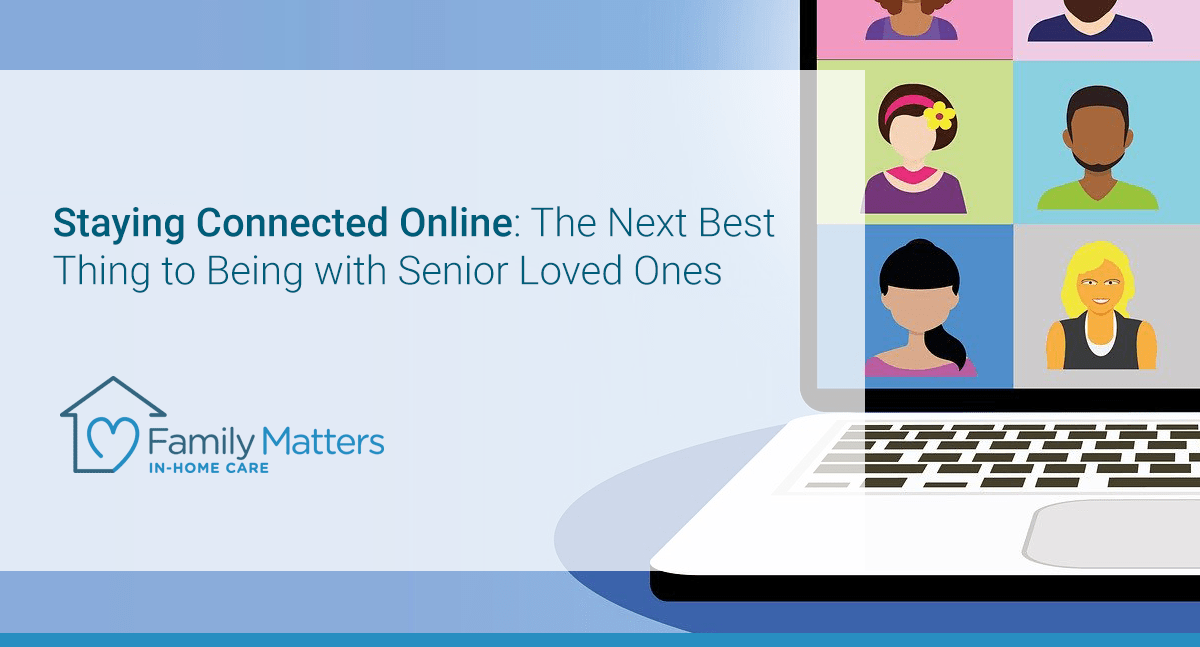
Staying Connected Online: The Next Best Thing to Being with Senior Loved Ones
What many of us most want to do right now is give our loved ones a big hug and sit down for some intimate heart-to-heart conversation. Unfortunately, that’s just not as possible these days, even if we live nearby.
So, how should we communicate with our loved ones who might be sheltering in place or living in a facility with contact restrictions? There are several helpful options to stay in touch with long-distance loved ones, anytime.
Lack of technical knowledge is no longer a reason not to touch base. Most of our favorite restaurants, shops, and corporations are offering online options and may very well continue to do so for quite some time. It is time to help your senior and yourself relieve any fears they may have of online communication.
If you have a home care worker staying with your parents, ask them to set up some alternate methods of communication for you. Many of the solutions can be used on multiple platforms – smartphone, tablet, laptop, desktop. For those with troubled eyesight, consider setting up a tablet, laptop or desktop communication so the visuals are larger and the controls easier to manage.
If you are the in-home caregiver, it is equally beneficial to begin to set up this lifeline for both of you to the outside world. More people than ever are flocking to video chats and text messaging and those communications have no age limit. Once your loved one is set up with appropriate technology, you might even find that they are happily able to connect on their own with friends and family.
Tech Considerations for Your Senior
Check that the device supports:
- Increased sizing for fonts
- Voice commands
- Volume control or integration with hearing aids
- Larger buttons
- The ability to set up one touch “favorites” for frequently used sites or calls
For your own check-ins, we recommend setting aside a regular time and day each week so your loved one has something to look forward to. It also makes it easier on friends and family who might want to join in occasionally. If they know your video call occurs at the same link every week on Sunday at 5, for example, they might be able to drop in. Having a weekly, or even more often, video chat will help your senior to become more comfortable with the technology.
While this may feel like a time where we are apart, it doesn’t have to be. Through technology, we might be able to draw closer than before.
Communication with Home Care and Medical Teams
Home care and medical teams are also expanding their online communications, to help minimize risk of exposure. Remote appointments are also often an option, as many assessments can be done over phone or video.
Consider checking to see if your loved one’s healthcare providers have a remote option – whether by phone, text, or video chat. If you can avoid having them sit in a waiting room and in an exam room for questions that do not require hands-on care, virtual care makes so much sense. Virtual care options are especially helpful if they are provided by their current primary care doctor, who already knows them well. Prescription refills, recurring medical issues, and even minor concerns can be communicated quickly and without hassle. Check if your insurance covers this sort of “visit.”
Communication Options
- Good old-fashioned handwritten cards and letters
- Zoom, FaceTime, Skype or Google Hangouts “calls”
- Telephone calls
- Social media
- Text messages
Video Chat Ranks Highest
A recent study investigated modes of social contact and risk of depression in older adults. It found that, while face to face was the number one preferred mode of communication, video chats consistently were able to lower the rates of depression and loneliness in the seniors studied.
Sources
- https://f.hubspotusercontent30.net/hubfs/1708580/Marketing%20Monthlies/PDFs/0720-StayConnectedOnline.pdf
- https://www.caring.com/best-tablets-for-seniors#buyer%E2%80%99s-guide:-how-to-choose-a-tablet-for-seniors
- https://www.cnet.com/health/how-to-talk-to-a-doctor-online/
- https://health.usnews.com/health-care/patient-advice/articles/2019-01-04/video-chat-apps-can-help-seniors-avoid-social-isolation-and-depression
If you or your family member is considering in-home care as part of a plan to age in place, contact Family Matters In-Home Care today for a free consultation. Our team is dedicated to supporting your family and helping older adults enjoy life in the comfort of their own home for as long as possible.
Some of the services offered by Family Matter In-Home Care include: Alzheimer’s & Dementia Care, Bed & Wheelchair Transfer Assistance, Companionship, Housekeeping & Meal Preparation, Personal Care, Recovery Care, and Transportation.
Serving the San Francisco Bay Area and Greater San Diego, Family Matter In-Home Care has offices throughout California including: Campbell, CA, Roseville, CA, San Marcos, CA, and San Mateo, CA.
